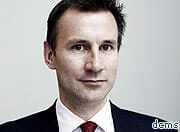Doctors who agreed to abort babies because they were girls will not be prosecuted, despite there being a “realistic prospect of conviction”.
Last year an investigation by The Daily Telegraph found two doctors offering to arrange abortions after being told that the women did not want the baby because of its sex.
But now, despite sufficient evidence for a prosecution, the Crown Prosecution Service (CPS) says doing so is not in the public interest.
Urgent
The decision has prompted concern from the Health Secretary – who called for “urgent clarification” on the issue.
And a Christian ethicist warned that the case seemed to put doctors “above the law”.
The CPS denied the move was a “policy decision”, and said the matter was for the General Medical Council. However the GMC cannot prosecute breaches of the criminal law.
Unacceptable
Health Secretary Jeremy Hunt said: “We are clear that gender selection abortion is against the law and completely unacceptable.
“This is a concerning development and I have written to the Attorney General to ask for urgent clarification on the grounds for this decision.”
Dr Peter Saunders, who leads the Christian Medical Fellowship, described the situation as “extraordinary”.
Disregarded
He said: “We seem to have a situation where, at the whim of the CPS, procedures that are clearly laid out in the Abortion Act can be completely disregarded by doctors and the NHS.
“That seems to put doctors above the law and raises questions about the CPS upholding the will of Parliament.
“We seem to have doctors being allowed to reinterpret the law with apparent impunity — it is quite extraordinary.”
Difficult
And David Burrowes MP, who sits on the all-party parliamentary pro-life group, said he would be “extremely disappointed” if the CPS “were seeking to put themselves in the position of politicians and Parliament by trying to suggest that this is not an offence that should be prosecuted”.
Keir Starmer – the country’s chief prosecutor – said: “This was a very difficult and finely balanced decision. It was based on the individual facts of the case; it is not a policy decision.”
He said the “specific reasons” would be laid out “in due course”.

